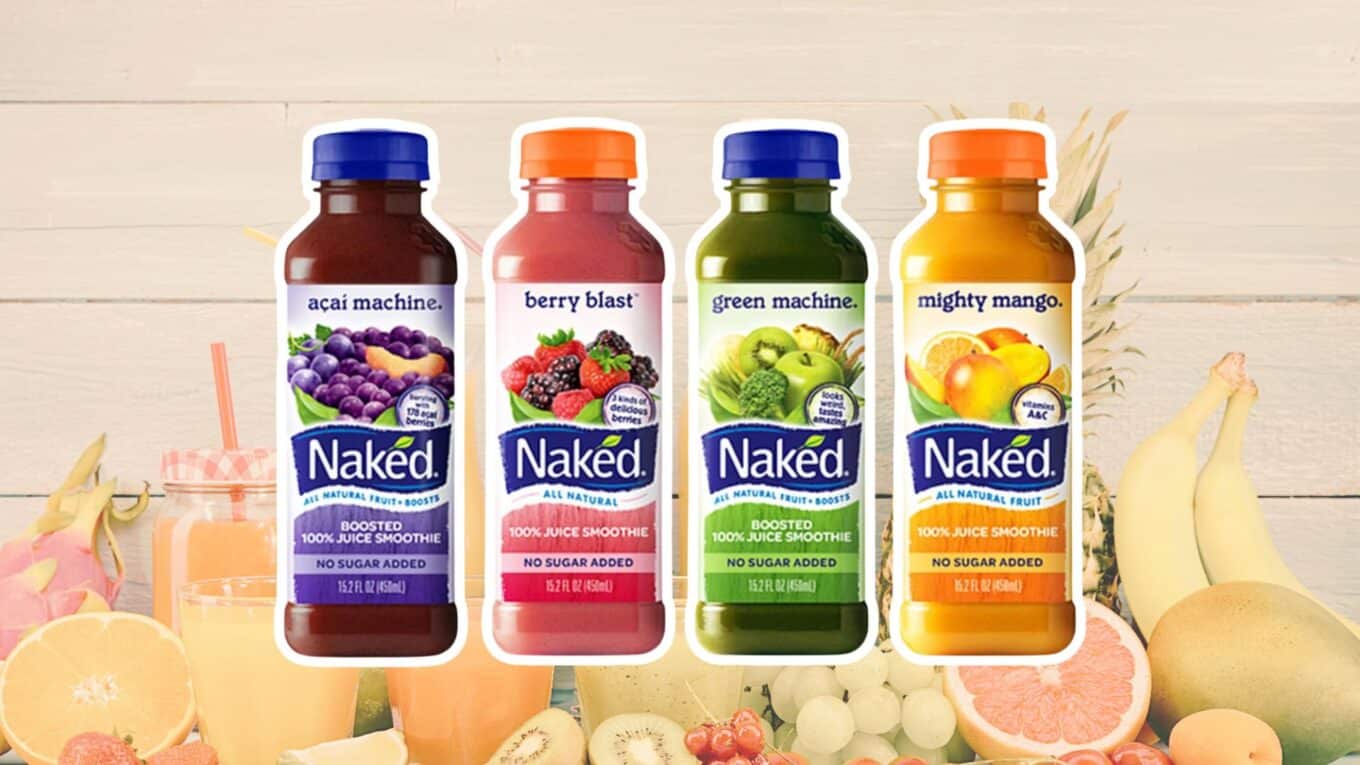Many people believe that Naked Juice is a healthy choice, but is it as nutritious as it seems?
While the brand offers all-natural, preservative-free juices packed with fruits and vegetables, the reality may differ.
Naked Juice has faced lawsuits and controversy over its ingredient labeling and sugar content.
This article will explore the potential downsides of Naked Juice compared to other brands, helping you make an informed decision about your juice consumption.
We’ll examine Naked Juice’s nutritional content, sugar levels, and overall health impact and compare it to alternative options.
By the end of this post, you’ll have a clearer understanding of whether Naked Juice is truly the worst choice or if better alternatives are available.
Key Features of Naked Juice
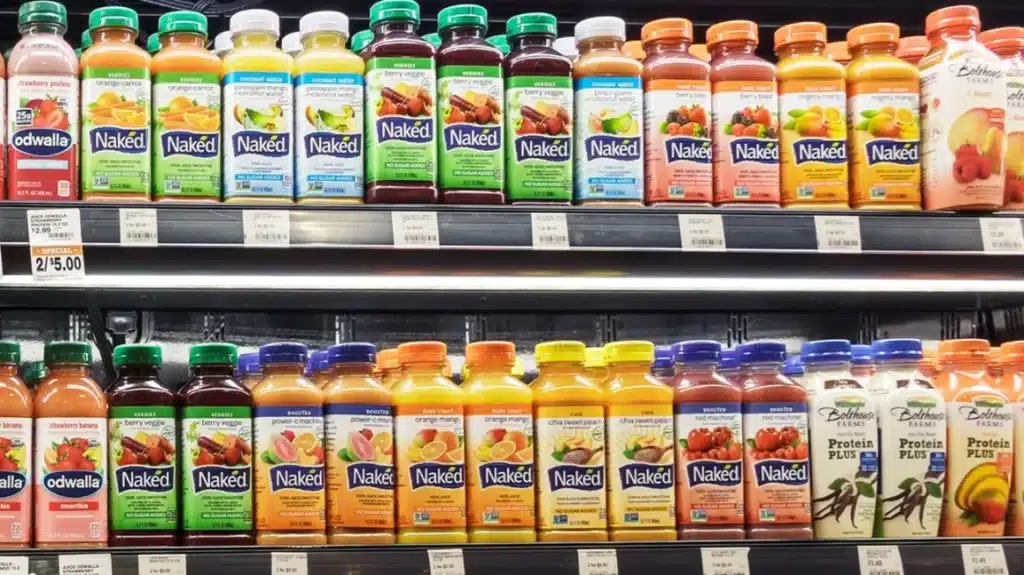
1. Nutritional Profile
Naked Juice may seem healthy due to its natural ingredients, but a closer look at its nutritional profile reveals some concerns.
High in Sugar
- One of the main problems with Naked Juice is its high sugar content.
- Each 15.2-ounce bottle contains a significant amount of naturally occurring sugars.
- The Green Machine flavor has 53 grams of sugar per serving, much higher than the recommended daily intake of 25 grams for women and 37.5 grams for men.
- Consuming too much sugar can contribute to health problems such as obesity, diabetes, and heart disease.
Low in Fiber
- Another issue with Naked Juice is its low fiber content.
- Most of the fiber is removed during juicing, which is a problem because fiber is crucial for digestive health and helps regulate blood sugar levels.
- Without enough fiber, the body absorbs the sugars more quickly, potentially causing blood sugar spikes.
- Additionally, Naked Juice is high in calories, with some flavors like the Red Machine containing up to 320 calories per bottle.
Consuming too many calories can lead to weight gain if these drinks are consumed in large quantities without accounting for their caloric impact on the overall diet.
2. Ingredients
Naked Juice prides itself on using a mix of natural ingredients and avoiding preservatives, added sugars, and artificial flavors.
This natural approach appeals to health-conscious consumers who are looking for clean-label products.
- Many Naked Juice flavors are fortified with vitamins and minerals, such as C, A, and B6.
- These added nutrients can help meet daily nutritional requirements and offer health benefits.
- However, some ingredients used in Naked Juice products can be controversial.
- For example, certain flavors include spirulina, a blue-green algae known for its high protein and nutrient content.
While spirulina is often marketed as a superfood, its use in consumer products can be debated due to varying opinions on its health benefits and potential contaminants.
Health Benefits of Naked Juice
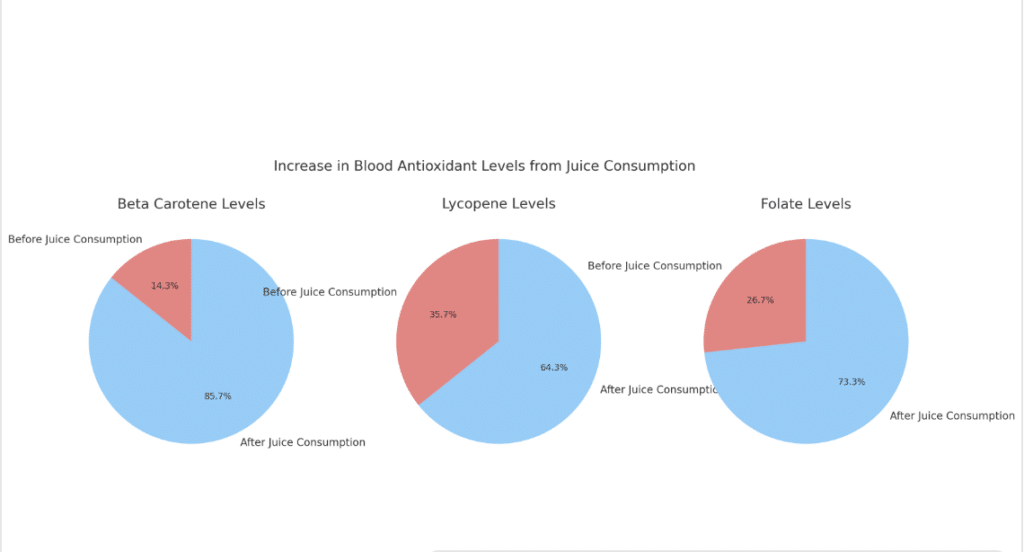
1. Antioxidant Content
Antioxidants are essential compounds that help protect the body from damage caused by free radicals, which are unstable molecules that can lead to oxidative stress and contribute to chronic diseases.
- These powerful compounds work by neutralizing free radicals, reducing oxidative stress, and preventing cell damage that can result in various health issues, such as heart disease, cancer, and neurodegenerative disorders.
- Research suggests that moderate consumption of 100% fruit and vegetable juices, like those offered by Naked Juice, can help meet daily antioxidant needs.
- A 14-week study involving 49 participants showed a significant increase in blood antioxidant levels and folate after consuming fruit and vegetable juices.
- Similarly, a 4-week study with 60 participants found a 528% increase in blood levels of beta-carotene and an 80% increase in lycopene levels among those who drank fruit and vegetable concentrate daily.
These studies indicate that incorporating such juices into the diet can boost antioxidant intake and potentially reduce the risk of chronic diseases.
2. Vitamin and Mineral Content
Naked Juice products provide a range of essential vitamins and minerals that contribute to overall health.
Each bottle contains various vitamins, such as Vitamin C, Vitamin A, and B vitamins (including B2 and B6), which support different bodily functions.
- Vitamin C: A powerful antioxidant that boosts the immune system, aids collagen production, and helps protect cells from oxidative damage.
- Vitamin A: Supports vision, immune function, and skin health.
- Vitamins B: Like B2 and B6, they are crucial in energy production, red blood cell formation, and brain function.
For instance, a 15.2-ounce bottle of Green Machine provides 50% of the daily value of Vitamin C, which helps strengthen immunity and reduce oxidative stress.
- Vitamin A in Naked Juice products supports healthy vision and immune health.
- At the same time, the B vitamins found in these juices are essential for maintaining energy levels and proper neurological function.
- Naked Juice products offer notable health benefits through their antioxidant content and essential vitamins and minerals.
- These nutrients protect the body from oxidative stress, boost the immune system, and support overall health.
By understanding the specific contributions of antioxidants and vitamins, consumers can make informed decisions about incorporating Naked Juice into their diet for optimal health benefits.
Downsides of Naked Juice
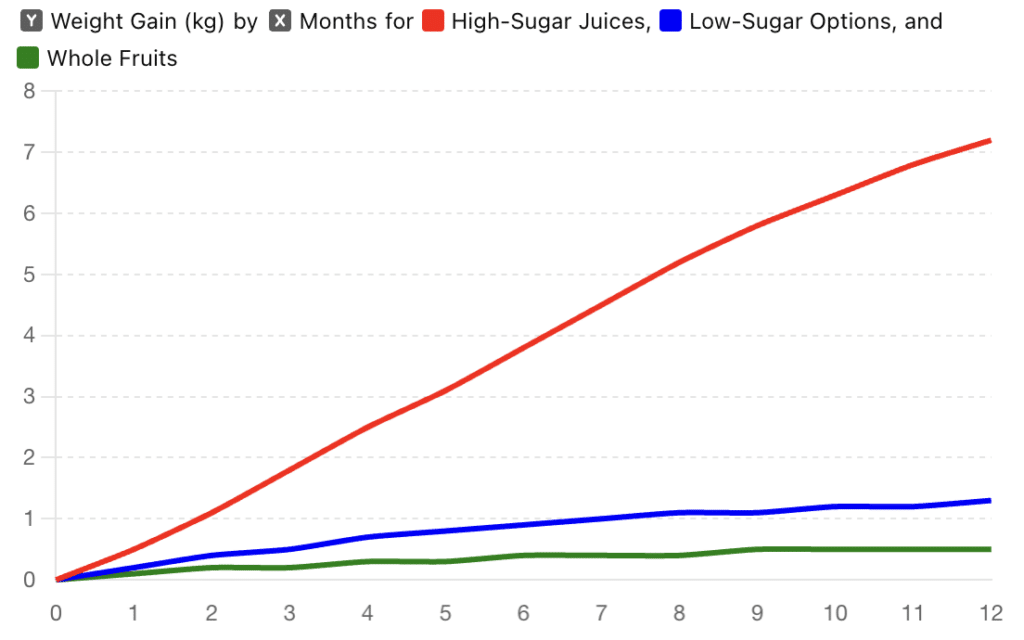
1. High Sugar Content
One of the main concerns with naked juice is its high sugar content.
- Despite being naturally occurring, the sugars in these juices can quickly add up and exceed the daily recommended limits.
- A 15.2-ounce bottle of naked juice can contain up to 76 grams of sugar, which is significantly higher than the American Heart Association’s recommended daily intake of 37.5 grams for men and 25 grams for women.
- This discrepancy between the actual sugar content and recommended limits is alarming, as excessive sugar consumption can lead to various health issues.
- Due to the high caloric content of these juices, consuming too much sugar can contribute to obesity.
- Additionally, high sugar intake is linked to an increased risk of developing type 2 diabetes, as it can cause insulin resistance and strain the body’s ability to regulate blood sugar levels.
Furthermore, elevated sugar consumption is associated with a higher risk of cardiovascular diseases, as it can lead to inflammation and the buildup of harmful fats in the bloodstream.
2. Low Fiber Content
Another significant downside of Naked Juice is its low fiber content.
- Fiber is a crucial component of a healthy diet, as it aids in digestive health, promotes regular bowel movements, and prevents constipation.
- Moreover, fiber helps maintain healthy cholesterol levels and reduces the risk of heart disease.
- It also promotes satiety, which can be beneficial for weight management.
- However, during the juicing process, most of the fiber is removed from the fruits and vegetables used in naked juice.
3. Consequences of Lack of Fiber
- Firstly, it can cause digestive issues such as constipation and bloating.
- Secondly, without fiber to regulate blood sugar levels, consuming these juices can result in rapid spikes and drops in blood sugar, which can be particularly concerning for individuals with diabetes or insulin resistance.
- Lastly, the absence of fiber makes these juices less filling, potentially increasing hunger and caloric intake.
3. Potential for Weight Gain
Naked Juice beverages are high in calories, with some bottles containing over 300 calories.
- This high caloric content and lack of fiber can contribute to weight gain over time.
- Liquid calories are often less satisfying than solid food calories, which may increase overall caloric consumption.
- Regularly consuming these high-calorie juices without the satiety benefits of fiber can gradually increase body weight.
- While other fruit juices may have similar sugar content, they might also include added sugars, making them even less desirable from a health perspective.
- Whole fruits provide the benefits of fiber that juices lack.
- They offer better satiety, more balanced nutrient intake, and a lower sugar concentration.
Consuming whole fruits instead of fruit juices can help maintain a healthy weight, provide more complete nutrition, and reduce the risk of the health issues associated with excessive sugar intake.
Naked Juice: Comparison with Other Brands
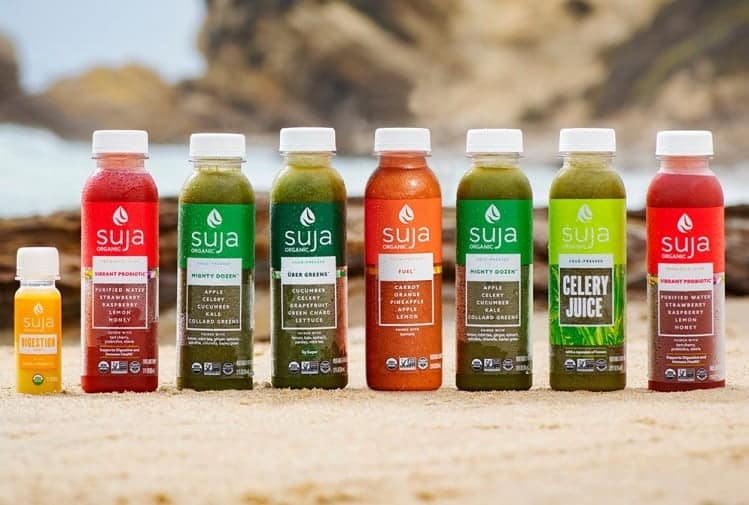
When evaluating the healthiness of Naked Juice, it’s essential to compare its nutritional profile with other popular juice brands.
By examining sugar and caloric content, fiber content, and overall nutritional value, consumers can make more informed decisions about their juice consumption.
1. Sugar and Caloric Content
Naked Juice is relatively high in sugar and calories compared to other juice brands.
- For example, a 15.2-ounce Naked Juice’s Green Machine serving contains 53 grams of sugar and 270 calories.
- In contrast, an 8-ounce serving of Tropicana’s Pure Premium Orange Juice has 22 grams of sugar and 110 calories, while a 15.2-ounce serving of Odwalla’s Original Superfood Juice has 44 grams of sugar and 240 calories.
- It’s important to note that Naked Juice does not contain added sugars, such as high fructose corn syrup, but instead derives its sugar content from natural sources like fruits.
- However, the high natural sugar content can still concern those monitoring their sugar intake.
Some other brands may use added sugars or artificial sweeteners, which can further impact the overall healthiness of the product.
2. Fiber Content
Naked Juice is relatively low in fiber, a crucial component of a balanced diet.
- Fiber helps maintain digestive health, regulates blood sugar levels, and promotes feelings of fullness.
- During the juicing process, most of the fiber from the whole fruits and vegetables is removed, resulting in a lower fiber content in the final product.
- Some juice brands employ methods to retain more fiber, such as pulp retention or adding fiber back into the juice.
- For example, certain juice blends from Bolthouse Farms include added fibers to enhance the nutritional profile.
However, whole fruits and vegetables still provide significantly more fiber than their juice counterparts.
An apple, for instance, contains about 4 grams of fiber, while apple juice typically has less than 1 gram per serving.
3. Overall Nutritional Value
Comparing the comprehensive nutritional value of Naked Juice with other brands reveals notable differences in vitamins and minerals.
Below is a table comparing key vitamins and minerals in a 15.2-ounce serving of Naked Juice’s Green Machine, Odwalla’s Original Superfood, and Suja’s Mighty Greens:
| Naked Juice Green Machine | Odwalla Original Superfood | Tropicana | Suja Mighty Greens | |
|---|---|---|---|---|
| Vitamin A | 50% DV | 25% DV | 0% DV | 60% DV |
| Vitamin C | 120% DV | 300% DV | 120% DV | 45% DV |
| Vitamin B6 | 50% DV | 30% DV | 6% DV | 15% DV |
| Potassium | 30% DV | 27% DV | 450% DV | 15% DV |
| Calcium | 8% DV | 8% DV | 2% DV | 20% DV |
*DV = Daily Value
When evaluating ingredient transparency and quality, it’s worth noting that some brands, such as Suja, emphasize the use of organic and non-GMO ingredients, which may appeal to consumers seeking more natural and sustainably sourced products.
While Naked Juice offers a convenient way to consume fruits and vegetables, its high sugar content, low fiber content, and overall nutritional value compared to other brands should be considered.
By examining these factors and the ingredient quality, consumers can make more informed choices that align with their health goals.
Opting for whole fruits and vegetables or juices with lower sugar and higher fiber content may be a more beneficial approach for those seeking to maintain a healthy diet.
Legal and Ethical Considerations
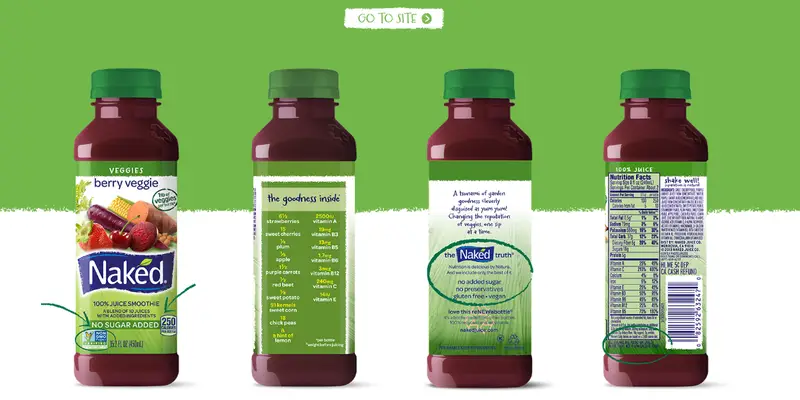
1. Misleading Marketing Claims
Naked Juice has faced significant legal challenges over its marketing practices.
In a notable case, the Center for Science in the Public Interest (CSPI) filed a class-action lawsuit against PepsiCo, the parent company of Naked Juice, alleging that the brand misrepresented its ingredient profiles.
Claiming to be Non-GMO AnD Natural
- The lawsuit claimed that Naked Juice deceived consumers by emphasizing high-value ingredients like kale and blueberries on the labels.
- In contrast, the primary ingredients, such as apple and orange juice, were often cheaper and less nutritious.
- Additionally, the lawsuit questioned Naked Juice’s non-GMO labeling and “all-natural” claims, arguing that some ingredients were synthetically produced and not truly natural.
PepsiCo Lawsuit
- PepsiCo settled for $9 million in response to the lawsuit while denying wrongdoing.
- The ethical implications of these misleading marketing strategies are significant.
- By overstating the presence of premium ingredients and making questionable health claims, Naked Juice risks deceiving consumers seeking healthier options.
- This deception erodes consumer trust and can damage the brand’s reputation in the long run.
As a company promoting health-conscious products, Naked Juice has an ethical responsibility to provide accurate and transparent information to its customers, allowing them to make informed choices.
2. Transparency and Consumer Trust
In contrast to Naked Juice’s approach, some other juice brands prioritize transparency and consumer education in their marketing practices.
For example, brands like Suja and Evolution Fresh emphasize using organic ingredients and provide detailed information about their sourcing and production processes.
- They also tend to avoid making exaggerated health claims, instead focusing on the inherent nutritional benefits of their ingredients.
- These brands are committed to building and maintaining consumer trust by adopting a more transparent approach.
- They recognize that consumers have a right to accurate information when making decisions about health-related products.
- Moreover, transparency helps brands comply with regulatory requirements surrounding health claims and labeling.
- Failing to adhere to these regulations can result in legal consequences and damage a brand’s reputation.
- Naked Juice faces significant legal and ethical scrutiny over misleading marketing claims.
The brand’s approach contrasts with its competitors’ transparent practices, highlighting the importance of honesty and clarity in the health and wellness industry.
Ultimately, transparency in marketing practices is essential for building and maintaining consumer trust, which is crucial for the long-term success of brands in this sector.
Conclusion
We’ve examined Naked Juice’s pros and cons and compared it to other brands. While it offers vitamins and minerals, its high sugar and low fiber content are concerning.
The legal issues surrounding marketing claims also raise questions about transparency. So, what’s next?
If you enjoy Naked Juice, consider it an occasional treat rather than a daily habit.
Try whole fruits and vegetables or juices with less sugar and more fiber for better options.
Brands like Evolution Fresh or Suja might be worth exploring. Remember, your health is in your hands.
Make informed choices about what you drink. Why not experiment with making your fresh juices at home?
This way, you control the ingredients and can add fiber-rich foods for a more balanced drink.
What’s your take on Naked Juice? Share your thoughts below!
Frequently Asked Questions
What Is The Nutritional Difference Between Naked Juice And Other Popular Juice Brands?
Naked Juice has higher sugar and calories but lower fiber than other popular brands like Tropicana and Odwalla, which can negatively impact overall nutrition.
How does the high sugar content in naked juice affect my health compared to other beverages?
If consumed excessively, the high sugar in naked juice can lead to weight gain, diabetes, and heart disease, similar to other sugary drinks like soda.
Are There Any Health Benefits To Drinking Naked Juice Despite Its High Sugar Content?
Naked Juice provides vitamins, minerals, and antioxidants for overall health, but the high sugar may outweigh these benefits if consumed excessively.
What Are The Best Alternative Juice Brands With Lower Sugar And Higher Fiber Content?
Better alternatives include Evolution Fresh, Suja, and Bolthouse Farms, offering lower sugar, higher fiber, and more balanced nutrition than Naked Juice.
How Can I Incorporate Juice Into My Diet Without Exceeding My Daily Recommended Sugar Intake?
Limit juice to one small serving daily, choose low-sugar options, and prioritize whole fruits and veggies for optimal fiber and nutrient balance.

